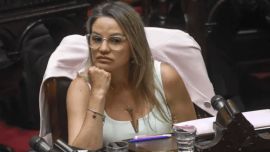The United States is warning President Alberto Fernández that his early foreign policy moves may jeopardise both support from the International Monetary Fund and US investment in the nation’s vast shale oil and gas fields.
A senior Donald Trump administration official said that sheltering former Bolivian president Evo Morales and engaging with Nicolás Maduro’s regime in Venezuela crossed a red line and could cost Argentina backing for new IMF funding and investment in the Vaca Muerta shale fields.
The official, who spoke on the condition of anonymity to discuss private talks, said while many of Fernández’s advisers are pragmatic and understand these risks, Vice-President Cristina Fernández de Kirchner’s influence within the administration is steering him closer to leftist leaders shunned by Washington.
A US State Department official said that the US had been clear that regional governments should support the interim Bolivian administration’s efforts to organise elections.
The US has also urged regional governments to deny Morales a platform to foment social unrest or influence Bolivian politics, the official added.
The White House did not immediately respond to requests for comment, while a US Treasury spokeswoman declined to comment.
Members of the Donald Trump administration voiced their concerns to Fernández and his advisers during recent meetings in Buenos Aires, Mexico City and Washington. The US officials have been irked by the asylum offer to Morales, plus signs that Fernández is aligning Argentina closer to other leftist politicians including Cuba’s Miguel Díaz-Canel, Venezuela’s Maduro and Ecuador’s ex-leader Rafael Correa.
That frustration boiled over last month when Mauricio Claver-Carone, a top adviser to US President Donald Trump flew to Buenos Aires but then skipped Fernández’s inauguration after learning that a sanctioned Venezuelan official was among the attendees.
YPF Chairman Guillermo Nielsen, a senior Argentine official involved in some of the talks, declined to comment.
A senior Argentine official denied the US would withdraw support for an IMF deal, adding that the topic was not brought up by US officials during Nielsen’s visit to Washington last month.
The US holds the most influence at the IMF as its biggest shareholder and was key in offering Argentina’s former president Mauricio Macri a record US$56-billion bailout. Alberto Fernández criticised the deal at the time, saying it was designed to help win Macri re-election, yet he’s since acknowledged the importance of “constructive and cooperative” dialogue with the Fund.
Meanwhile, he has touted Vaca Muerta as essential to spurring growth in an economy that’s dipped in-and-out of recession for the past decade.
While Trump surprised Fernández with a congratulatory call after his October election, the two have already been at odds on a range of foreign policy issues. That friction comes at a delicate time for Argentina. Fernández’s government said it’s unable to pay its debt and is starting talks with the IMF and bondholders. US officials had advised Argentina to negotiate with the IMF first before engaging with creditors, the person said.
When Morales resigned as Bolivia’s leader in November, Fernández aligned himself with Venezuela, Cuba and Mexico, criticising Trump for applauding what he called a military coup.
The US “regressed decades” on foreign policy and “moved back to the worst of the 1970s, endorsing military interventions against popular governments,” Fernández told a local radio station at the time. Just days after taking office, his government accepted Morales’s request for asylum in Argentina.
The Argentine leader also poses a potential roadblock to Trump’s policy goals in Venezuela. Last January, the US rallied most of the region’s heads of state, including Macri, behind Venezuelan opposition leader Juan Guaidó in an effort to topple Maduro. But Fernández has refrained from calling Maduro a dictator and suggested Argentina may take a more neutral approach toward Caracas.
related news
by Ben Bartenstein & Patrick Gillespie, Bloomberg























Comments